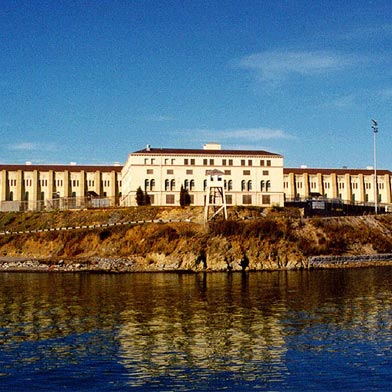 California’s federal and state court battle to carry out the state’s first execution in nearly five years on Thursday came to end today when the California Supreme Court blocked the proceeding.
California’s federal and state court battle to carry out the state’s first execution in nearly five years on Thursday came to end today when the California Supreme Court blocked the proceeding.
Albert Greenwood Brown, 56, was scheduled to die by lethal injection at San Quentin State Prison at 9 p.m. Thursday for the 1980 rape and strangulation of Susan Jordan, 15, of Riverside.
But the high court prevented the execution when it refused the state’s emergency request for acceleration of an appeal deadline in a case in a state lawsuit on execution procedures.
The court’s seven justices, after meeting in San Francisco, unanimously agreed, “No compelling reason appears why this court should, by extraordinary means, remove an obstacle to Brown’s execution by denying” the normal appeal time in a case filed by two other inmates.
The high court action left a 2007 Marin County Superior Court injunction against executions in place while two inmates appeal a Sept. 20 appeals court ruling that would dissolve the injunction. The inmates have until 11:59 p.m. Thursday to appeal, and the ban will remain in effect until the top court decides whether to hear the appeal.
Thursday was the last day this year the execution could occur because the state’s only supply of one of the drugs used, the sedative sodium thiopental, expires on Friday.
Because of a national shortage, authorities don’t expect to obtain more until early 2011.
Soon after the state court ruling, state lawyers officially dropped their federal appeal of a stay of execution issued by U.S. District Judge Jeremy Fogel of San Jose on Tuesday, and the state Department of Corrections and Rehabilitation cancelled the execution.
State lawyers told the 9th U.S. Circuit Court of Appeals in San Francisco that their federal appeal was moot because “no execution of Albert Greenwood Brown can occur on September 30, 2010, as a matter of state law.”
State Supreme Court justices said in their three-page order that the state helped to create a legally chaotic situation by scheduling the execution for this week while knowing “it faced the imminent loss of an essential ingredient to the execution on October 1, 2010.”
“The state has itself contributed to circumstances incompatible with the orderly resolution, pursuant to normal procedures, of pending legal issues in connection with the executions under new regulations,” the court said.
Gov. Arnold Schwarzenegger decried the execution delay, saying in a statement, “Albert Brown was sentenced to death for committing the most heinous and unconscionable crimes.
“Now 30 years later the state is still unable to carry out his execution. It is absurd that our legal system continues to prevent the state from carrying out the will of the people.”
In another development before the execution was cancelled, Schwarzenegger turned down Brown’s petition for clemency.
“The state is confident it will ultimately prevail on this issue,” Corrections department spokeswoman Terry Thornton said.
Groups opposing the death penalty praised the state and federal court rulings.
“It is not surprising the courts finally halted the execution from proceeding, given the numerous pending legal questions,” said Natasha Minsker, death penalty policy director of the American Civil Liberties Union of Northern California.
“What is surprising is that the state moved forward with requesting execution dates when so many uncertainties remained.”
Lance Lindsey, executive director of Death Penalty Focus, said, “By replacing the death penalty with life without possibility of parole, we would save the families of murder victims from this painful legal roller coaster ride.”
Brown was on parole for the rape of a 14-year-old girl when he abducted Susan Jordan as she walked to her high school, raped her and strangled her with a shoelace. He was convicted and sentenced to death in Riverside Superior Court in 1982.
He has completed all appeals of his conviction and sentence, but he sought to delay his execution by joining pending federal and state court challenges to California’s lethal injection procedures.
In the federal case before Fogel, death row inmate Michael Morales claimed in a 2006 lawsuit that the state’s three-drug protocol carries a risk of causing severe pain in violation of the U.S. Constitution’s ban on cruel and unusual punishment. Brown joined that lawsuit this month.
The inmates contend the heart-stopping third drug can use extreme pain, while the paralyzing second drug masks any pain.
Fogel ruled in 2006 that the procedure then in effect had numerous flaws. The state then began revising the protocol.
Morales another death row inmate, Mitchell Sims, filed a lawsuit in 2007 in Marin County Superior Court claiming the state’s revised protocol lacked the public review required under a state law and won an injunction against executions.
The state completed that review earlier this year, causing the Court of Appeal to rule on Sept. 20 that the injunction should end. That is the ruling with the appeal deadline of 11:59 p.m. Thursday.
Attorney Sara Eisenberg said today that Sims and Morales do plan to appeal before that deadline.
The state’s unsuccessful emergency petition to the California Supreme Court asked the panel to declare the deadline to be 5 p.m. Thursday and, if no appeal were filed, to order the Court of Appeal and Superior Court to issue the administrative orders needed to end the injunction by 7 p.m. Thursday. State lawyers also asked the court to rule immediately on any appeal that might be filed.
In August, Sims filed a new lawsuit in Marin County Superior Court claiming the public review wasn’t carried out in accordance with the requirements of a state administrative law. Brown joined that suit this month, and that case remains pending before Judge Verna Adams.
Julia Cheever, Bay City News









